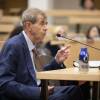In a speech Thursday at American University in Washington, D.C, Massachusetts Sen. Elizabeth Warren laid out her vision for US foreign policy — echoing the domestic-policy arguments she’s made for years, and sending another strong signal that she’s headed toward a presidential run in 2020.
For decades, Warren argued in her address, the U.S. was fundamentally a force for good in the international arena. But in the 1980s, that changed, as decisions made to benefit a small, wealthy elite began to have a devastating effect on everyone else.
“Mistakes piled on mistakes," Warren said. "Reckless, endless wars in the Middle East. Trade deals rammed through with callous disregard for working people. Extraordinary expansion of risk in the global financial system.
“And why? Mostly to serve the interests of big corporations while ignoring the interests of American workers.”
In addition, Warren argued, the U.S. dedicated itself to exporting a pernicious economic philosophy.
“Washington technocrats backed austerity, deregulation and privatization all around the world,” she said. “As one crisis after another hit, the economic security of working people around the globe was destroyed, reducing public faith in both capitalism and democracy.”
The result, Warren said, has been a drift toward authoritarianism, both abroad and here at home — with China, Russia, and President Donald Trump prominent cases in point.
“President Trump’s actions and instincts align with those of authoritarian regimes around the globe,” Warren said. “He embraces dictators of all stripes. He cozies up to white nationalists. He undermines the free press and incites violence against journalists. He attacks the independence of our Judiciary.”
To rectify these developments, Warren suggested several different steps, including crafting “new rules for global capitalism,” ending the war in Afghanistan, reducing the influence defense contractors have on military policy and ramping up international arms-control efforts.
She also panned Trump’s efforts on trade, saying the renegotiated NAFTA deal he’s poised to sign doesn’t go far enough.
“As it’s currently written, Trump’s deal won’t stop the serious and ongoing harm NAFTA causes American workers,” Warren said. “It won’t stop outsourcing, it won’t raise wages, and it won’t create jobs. It’s NAFTA 2.0.”
Toward the end of her speech, Warren quoted President John F. Kennedy, who gave a seminal foreign-policy address at American University 55 years ago in which he said, “Our problems are man made; therefore, they can be solved by man.”
“The same is true today,” Warren said. “OK, I’d add they can be solved by women as well."
“None of this will be easy,” she concluded. “But we will persist. I believe in us. I believe in what we can do. I believe in democracy, and I believe in what we must do to save it.”
While Warren has been mentioned as a possible presidential candidate for years, the evidence that she’s seriously considering a run in 2020 has mounted in recent months.
At a September town hall in Holyoke, Mass., Warren said she would take a “hard look at running for president.” In October, she released the results of a DNA test that seemed to corroborate her controversial claims of Native American ancestry, though public response to both the test results and Warren’s framing of them was mixed. And in November, after easily winning re-election over her Republican challenger, State Rep. Geoff Diehl, Warren gave a victory speech that sounded strikingly like an unofficial presidential-campaign kickoff address.





